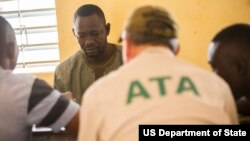It’s been 40 years since the United States created the Antiterrorism Assistance Training program. At a press briefing, Julie Cabus, U.S. Deputy Assistant Secretary and Assistant Director for Training in the Diplomatic Security Service, noted that since its creation, the ATA has delivered counterterrorism training to over 160,000 students in 150 different countries:
“Last year alone, ATA trained nearly 5000, about 4700 students, in approximately 47 different nations. Since its inception, ATA has represented a true partnership across the State Department focusing on the global challenge of helping nations combat terrorism and confront terrorism.”
The ATA program is the combined responsibility of the State Department’s Bureau of Counterterrorism and the Diplomatic Security Service. Gregory LoGerfo, Deputy Coordinator for Regional and Multilateral Affairs in the Counterterrorism Bureau, emphasized the cooperative relationship between the United States and the host countries in the ATA program.
“We listen. We listen to what our partners need, what their specific concerns are, because they face unique situations in their countries and in their regions,” he said. “We do build out partnership on equal footing because we have shared interests in confronting civilian security challenges.”
Deputy Assistant Secretary Cabus noted that confronting terrorism is physically and emotionally demanding, and that ATA trainers “expect a lot” from their students.
“They create a safe environment to explore the ethics of the training, the strategy of the training, the tactics, the decision-making, and sharing of real-word experiences with law enforcement partners and peers around the world,” she said.
Ms. Cabus underscored that a key component of the ATA program is an emphasis on professionalism and human rights. “Maintaining the highest standard of professional conduct helps build trust and critical relationships with communities in which they serve,” she said. “Every ATA course that is offered around the world is required to provide human rights education … It’s part of our training, it’s part of who we are.”
As for the students, Deputy Assistant Secretary Cabus said, “In an overwhelming majority of instances or countries … we have been afforded the opportunity to work with the best of the best that they have to offer: committed, dedicated public servants who are there to serve their country, their people, build trust within their communities, and who see the big picture – the need to counter terrorism for the benefit of all.”






